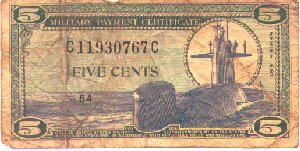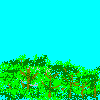July 24 - August 3, 1969 |
||
|---|---|---|
|
The mountain range formed a natural barrier between Vietnam and Laos. The mountains were steep
and there was very little land that was suitable for farming. They were so high that
helicopters had to fly through a pass rather than fly over them. They seem
to go straight up on each side with a beautiful river waterfall cascading below. Clouds would
often hang on top of the mountains and we would be given a triangular tunnel to pass through.
My eyes told me I was seeing the Garden of Eden but my military experience reminded me
of the danger of being channeled into such a narrow space.
This mountain area near the border was also uninhabited, which gave the NVA some protection as they moved between North and South Vietnam. Much of the area had been designated as a free drop zone where war planes could release bombs that, for one reason or another did not get released over their designated targets. As we flew through the rugged valleys it was not unusual to see them scarred by bomb craters. A 500 pound bomb could make a crater 15 feet deep and over 30 feet across and leave no signs of the trees and earth that must have existed prior to the bomb. With the exception of being startled by a monkey walking up on us, the mission had been uneventful. On day 5, we were told that due to weather conditions, our extraction would be postponed. Knowing that we couldn?t be extracted also meant it would be difficult to get gun ship support if we needed it. We decided to quit moving and found a nice defensive position in some brush next to a bomb crater. The battery on our radio ran out and I installed the only backup battery. On day 6, we were told to standby, but the helicopters were still grounded As we sat in the rain, it was obvious to us we would not be extracted. To conserve food, we decided to only eat one meal a day. On one of the radio checks, I was told there would be some heavy artillery in our area. It was not unusual for the artillery units to fire around us, so I acknowledged the information and turned the radio off. The rains had turned our camp into a mud pit. I tried to get as comfortable as I could while lying in the mud, hungry and trying to calculate how much longer the batteries might last before I lost contact with the world. The earth beneath me began to bounce me where I lay. Moments later, the noise reached my ears and the sound was deafening. I wondered if the whole earth was just crumbling apart. This Armageddon seemed to last an eternity but must have been less than a minute. I turned on the radio to see if the rest of the world survived this apparent disaster. I was relieved to hear a voice on the other end of the radio. I asked if they knew what had happened. "You must have heard the Arc Light (Multiple B-52?s, dropping multiple 500 pound bombs.). We were told you were more than 3 miles from the target area and would be OK, but we weren?t permitted to broadcast the strike over the radio. We hoped you would understand the heavy artillery clue". On day 7 the rains stopped and things were looking up. We decided to conserve the battery on the radio, we would do radio checks every 3 hours instead of every 2 hours. To conserve food, we decided two men could share one ration for the day. We were told to standby, but the helicopters were still grounded. I tried to visualize the pass being fogged over, but the blue skies and hot sun was making it difficult. As we dried out into mud cakes, we heard the sound of a helicopter. When I spotted the helicopter I turned on the radio to see if this might be our extraction helicopter. Instead of my unit answering another voice came over the radio. "Negative Delta Tango. This is Charlie Pappa, checking out the situation." "I replied this is Delta Tango, if this is not an extraction, don?t waste my batteries!" and I turned off the radio. We could not believe that our spirits had been lifted only to be sunk again. The helicopter continued to fly in our area and the longer it flew the madder we got. I turned on the radio again and said "This is Delta Tango, I have obviously spotted an enemy helicopter, since all of our birds are grounded. This helicopter says it can?t come down, but if it flies over me one more time I?ll show you it can come down!" The helicopter left our area. Day 8, I would say a prayer each time I turned on the radio that the batteries still worked. We decided to postpone our half meal for the day until late afternoon. The day was cloudy and not nearly as clear as the previous day. We decided for Day 9 we would divide one meal 4 ways and we would do the same on Day 10 with our last meal. There was very little hope the radio would still be working on Day 10. I was already thinking about the survival skills I had been taught and thinking about the increased danger in hunting for food. Our situation was becoming critical, but I knew we were not forgotten. I turned on the radio for an early afternoon check, and heard the only news I wanted to hear. "Get ready, the helicopters are already on their way." The helicopters were a beautiful sight as we popped smoke. The helicopter hovered over the bomb crater while we climbed aboard. We flew through the pass safely and we watched from above as another LRRP team was extracted. When the helicopter landed we were greeted by the Lieutenant. I was informed two pieces of business had to be taken care of before we did anything else. First, there had been a script exchange while we had been out.
As we left the office, I asked the Lieutenant about the other important piece of business. The Liutenant answered "The Battalion Commander, Colonel Pinney, wants YOU to know his call sign is 'Charlie Pappa'". I answered "Yes Sir", and it was never mentioned again.
|
 Story INDEX
Story INDEX
|
 NEXT Story
NEXT Story
|
|---|
Web Page Created 12 Jan 1998
© 1997 C. Warren Gallion
eMail: wgal@wgallion.com

